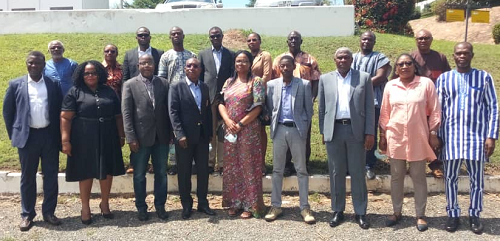
Phase II of ECOWAS Regional Electricity Market starts in 2022/2023
The Chairman of the ECOWAS Regional Electricity Regulatory Authority (ERERA), Professor Honoré Bogler, says the second phase of the ECOWAS Regional Electricity Market will be launched at the end of 2022 or at the beginning of 2023.
The second phase, which is the real operationalisation of the Regional Electricity Market, was originally slated for implementation in 2021.
However, implementation of the second phase could not begin as planned due to the impact of the COVID-19 pandemic.
Whereas the first phase tried to harmonise the activities of the electricity regulatory bodies in the member states, the second phase is to be characterised by a competitive market which will help to promote efficiency, where the market will be governed by market rules and not state rules.
The first phase of the regional power market was launched in June 2018 in Cotonou, Benin, as a transitional phase meant to last for a maximum of two years before the introduction of the second phase.
Workshop
But speaking with Graphic Online in an interview on the sidelines of a workshop, organised by ERERA at Akosombo in the Eastern Region on September 29, 2021, to build the capacity of communication experts from the electricity regulatory authorities in the ECOWAS member states, Prof Bogler expressed the hope that the second phase of the regional power market was on course of implementation although it had been delayed by the COVID-19.
He explained that the implementation of the second phase of the project would largely depend on other conditions that were under COVID-19 consequences, saying "Because what COVID-19 brought to us is a delay of about two years and we are trying to catch up by fast tracking things to get it done within the space of one year or one and half years."
He said ERERA was working hand-in-hand with the West African Power Pool (WAPP) Secretariat, a cooperation of the national electricity companies in Western Africa, to fast-track activities in order to start the implementation of the second phase of the project.
Objectives of workshop
The workshop was on the fundamentals of regulation and introduction to the ECOWAS Regional Electricity Market.
It is part of the ongoing Technical Assistance of the European Union (EU) to ERERA relating to the EU-funded programme on Improving the Governance of the Energy Sector in the ECOWAS region (AGOSE-AO).
Among the specific objectives of the training workshop was to enhance the knowledge of communication experts on all aspects of the ECOWAS Regional Electricity Market—Market Development, Transmission Services, Information Management, and Gender Mainstreaming.
It was attended by 13 representatives from 11 member states, namely Ghana, Ivory Coast, Burkina Faso, Togo, Benin, Nigeria, Niger, Senegal, The Gambia, Liberia and Sierra Leone.
Ghana and Ivory Coast had two participants each, whilst the remaining countries had one representative each.
Role of communicators
Touching on the essence of the workshop, Prof Bogler said communication experts in the regional electricity regulatory bodies needed to be abreast with events about the regional electricity market so that they could communicate well with their people.
“You can do whatever you want for people but if they are not aware, it may not succeed. It is only when they understand that it will work. That is why communicators are important,” he said.
He noted further that as part of measures to increase awareness of the market and related activities, the Authority had planned to tour all member states, but it was botched by the COVID-19 pandemic.
The ECOWAS Resident Representative in Ghana, Baba Gana Wakil, said well-informed communicators were key to pushing the electricity market project which is intended to collectively address electricity challenges in West Africa.
He has, therefore, urged the communicators of the electricity regulatory bodies in ECOWAS to constantly upgrade their capabilities and also familiarise themselves with things that could promote regional integration.
New policy
For him, the workshop would not only make the participants useful to their respective institutions, but to the general development of all ECOWAS institutions in the sub-region.
Gana Wakil also indicated that ECOWAS, with support from GIZ, was reviewing its two-decade old Information, Communication Technology (ICT) policy to be abreast of current trends in communication.
